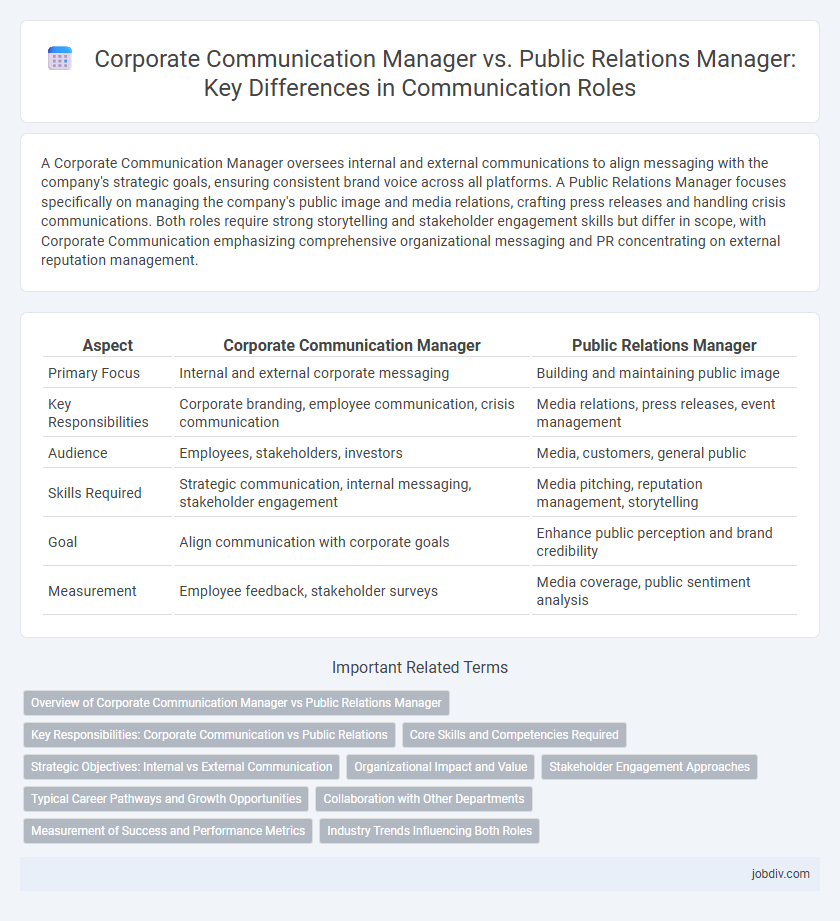A Corporate Communication Manager oversees internal and external communications to align messaging with the company's strategic goals, ensuring consistent brand voice across all platforms. A Public Relations Manager focuses specifically on managing the company's public image and media relations, crafting press releases and handling crisis communications. Both roles require strong storytelling and stakeholder engagement skills but differ in scope, with Corporate Communication emphasizing comprehensive organizational messaging and PR concentrating on external reputation management.
Table of Comparison
| Aspect | Corporate Communication Manager | Public Relations Manager |
|---|---|---|
| Primary Focus | Internal and external corporate messaging | Building and maintaining public image |
| Key Responsibilities | Corporate branding, employee communication, crisis communication | Media relations, press releases, event management |
| Audience | Employees, stakeholders, investors | Media, customers, general public |
| Skills Required | Strategic communication, internal messaging, stakeholder engagement | Media pitching, reputation management, storytelling |
| Goal | Align communication with corporate goals | Enhance public perception and brand credibility |
| Measurement | Employee feedback, stakeholder surveys | Media coverage, public sentiment analysis |
Overview of Corporate Communication Manager vs Public Relations Manager
A Corporate Communication Manager oversees internal and external communications to align with a company's strategic goals, managing brand messaging, employee communication, and stakeholder engagement. In contrast, a Public Relations Manager primarily focuses on maintaining a positive public image through media relations, crisis communication, and reputation management. Both roles require expertise in communication strategies, but the Corporate Communication Manager has a broader scope encompassing organizational communication beyond public perception.
Key Responsibilities: Corporate Communication vs Public Relations
Corporate Communication Managers oversee internal and external messaging strategies, aligning communication with organizational goals to enhance brand consistency and employee engagement. Public Relations Managers focus on managing the company's public image through media relations, crisis management, and reputation building in external audiences. Both roles require strategic communication skills but differ in targeting internal stakeholders versus the broader public and media channels.
Core Skills and Competencies Required
A Corporate Communication Manager requires expertise in strategic communication planning, internal communications, and reputation management, emphasizing leadership and cross-departmental collaboration skills. In contrast, a Public Relations Manager excels in media relations, crisis communication, and brand messaging, with strong skills in storytelling, media pitching, and stakeholder engagement. Both roles demand excellent written and verbal communication abilities, but they differ in scope, with Corporate Communication Managers focusing on broader organizational messaging and PR Managers concentrating on external audience perception.
Strategic Objectives: Internal vs External Communication
Corporate Communication Managers concentrate on aligning internal communication strategies with organizational goals, fostering employee engagement and culture through consistent messaging. Public Relations Managers focus on external communication, managing the company's reputation and relationships with media, stakeholders, and the public to enhance brand perception. These roles strategically differ, with Corporate Communication emphasizing internal stakeholder alignment and Public Relations prioritizing external audience influence.
Organizational Impact and Value
Corporate Communication Managers shape internal and external messaging to align with organizational goals, enhancing brand consistency and employee engagement. Public Relations Managers focus on managing media relations and public perception, driving external reputation and crisis management. Both roles significantly impact stakeholder trust and business value by strategically communicating the company's mission and responses.
Stakeholder Engagement Approaches
Corporate Communication Managers develop comprehensive stakeholder engagement approaches by aligning internal and external communications to reinforce brand consistency and organizational values, leveraging multi-channel strategies including digital platforms, corporate events, and internal newsletters. Public Relations Managers focus on crafting targeted narratives to manage public perception and media relations, engaging stakeholders through press releases, media interviews, and crisis communication protocols that enhance reputation and trust. Both roles prioritize building and sustaining stakeholder relationships but differ in communication scope and tactical methods tailored to internal audiences versus broader public or media groups.
Typical Career Pathways and Growth Opportunities
A Corporate Communication Manager often progresses from roles such as communication specialist or internal communications coordinator, advancing towards leadership positions like director of corporate communications or chief communications officer, focusing on internal and external stakeholder engagement. In contrast, a Public Relations Manager typically starts as a PR assistant or coordinator, moving up to senior PR manager or communications director roles, with career growth centered on media relations, brand reputation, and crisis management. Both paths offer opportunities in strategic communication leadership, but Corporate Communication Managers tend to have broader organizational influence, while Public Relations Managers specialize in managing public perception and media strategies.
Collaboration with Other Departments
A Corporate Communication Manager collaborates closely with marketing, human resources, and legal departments to ensure consistent messaging and alignment with corporate strategy. Public Relations Managers primarily engage with media relations, sales, and crisis management teams to maintain a positive public image and handle external communications effectively. Both roles require seamless interdepartmental coordination to foster cohesive communication and uphold the organization's reputation.
Measurement of Success and Performance Metrics
Corporate Communication Managers measure success through key performance indicators (KPIs) such as internal engagement scores, employee feedback, and communication reach across organizational channels. Public Relations Managers focus on media coverage volume, sentiment analysis, share of voice, and audience reach to evaluate the impact of PR campaigns. Both roles utilize analytics tools and data-driven insights to align communication strategies with business objectives and stakeholder expectations.
Industry Trends Influencing Both Roles
Industry trends such as digital transformation and social media proliferation significantly shape the responsibilities of both Corporate Communication Managers and Public Relations Managers. Corporate Communication Managers increasingly integrate data analytics and internal communication platforms to enhance stakeholder engagement, while Public Relations Managers prioritize real-time reputation management and influencer partnerships in a fast-paced media environment. Emerging trends like ESG communication and crisis response automation also drive strategic shifts in both roles across industries.
Corporate Communication Manager vs Public Relations Manager Infographic

 jobdiv.com
jobdiv.com